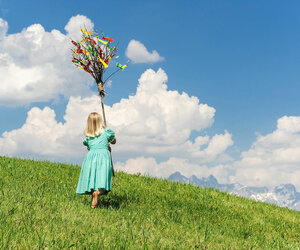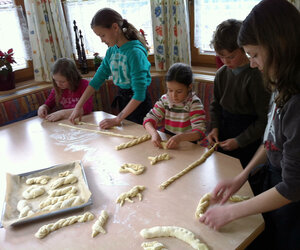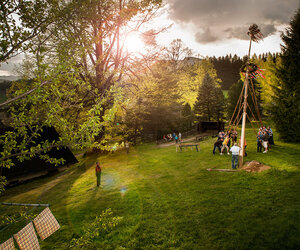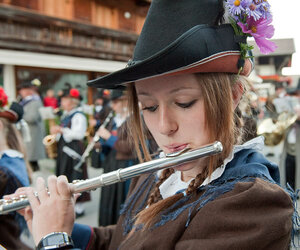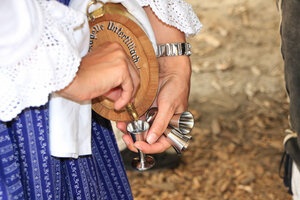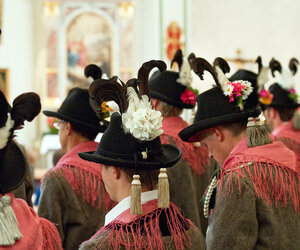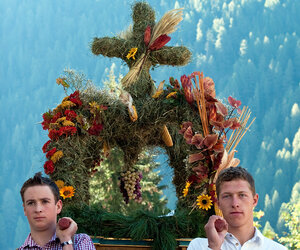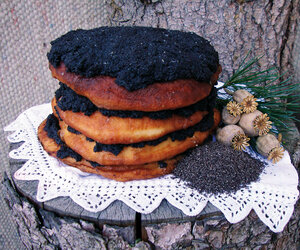Along with the day-to-day work of the farmer, traditions and customs are also a feature of agricultural life. Traditions and customs for the most part have an ecclesiastical background. Old traditions are still celebrated and embodied in farming families in particular. Each year is filled with wonderful traditions, which contributes to social gatherings and a good sense of community.
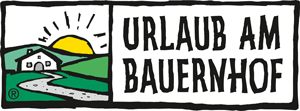
Traditions
Easter/Spring
ASH WEDNESDAY
Ash Wednesday marks the start of the 40-day fast period. On Ash Wednesday people who attend mass, ash from burnt palm branches is used to make the mark of a cross on their foreheads. No dancing events take place during the fasting period.
HOLY WEEK
On Maundy Thursday it is said that „the bells fly to Rome“. This is symbolic of the beginning of the suffering of Christ. The Maundy Thursday liturgy takes place in the usual way in Osttirol, with the veneration of the cross. There is then generally a period of reflection and of prayer, which can last right through until the evening of Holy Saturday.
April/May
MAY POLE
In Osttirol a May Pole can be seen in almost all towns. They are for the most part associated with wonderful festivities. The May Pole has to be watched for three full days, so that it is not tampered with. On 1st May a ‘wake-up call’ by the entire music group follows. The group proceeds through the district, playing marches and awakening the inhabitants.
MOTHER’S DAY
Mother’s Day is the day that Dads and children get up early, make the breakfast and flowers are freshly picked from the surrounding fields. Some poetry and a nice meal might also feature on this day.
Summer
SEVEN SLEEPERS DAY
A feast day, since the weather on 27th June, which is known as Seven Sleepers Day, will stay like that for seven weeks. A very significant day for farmers, for if the sun shines on this day then they can look forward to a hot summer.
ASCENION OF THE VIRGIN MARY
15th August is the highlight of summer in the mountains. The day of the Ascension of the Virgin Mary marks the farewell of summer. This day is celebrated in many areas. People go into the fields to gather bunches of herbs and bring them into the church to celebrate High Mass.
Autumn
„SCHUTZENGELSONNTAG“
On the first Sunday in September „Schutzengelsonntag“ (Guardian angel Sunday) is celebrated. This is a celebratory church day in many places. There is a celebration and these days there is a really big party based around a town’s respective church day. A trip to a church day celebration definitely ought to feature in your holiday.
Dezember
ST NICHOLAS
There are quite a number of legends based around the current St.Nicholas. St. Nicholas day celebrations in Osttirol are legendary and known about right across its borders. ‘Krampusse’ and ‘Klaubaufe’ run about the town. This is when young, strong boys dress as ‘Krampusse’ and there are events and shows based around this tradition held throughout the towns. One very spectacular event can even be witnessed by guests behind the table in the snug. It is said that you have to hold on to the table very tightly so as not to get involved in a skirmish between good and evil.
ADVENT AND CHRISTMAS
On St. Barbara’s day (4th December) people cut off a branch from a tree, usually a cherry tree, and take it into their homes. The „Barbara“ branch should then blossom on 24th December. Christmas time is for the most part a tranquil period for farming families. Before the day dawns, many believers can be found on the dark streets during Advent to attend Mass earlier. According to an old tradition, „Thomastag“ is „Zeltenbacktag“, and today still all the important preparations or Christmas are still carried out on this day. The Christmas tree is procured. The farmer heads into the forest to look for a nice tree which he will then saw down. In agricultural families a „real“ tree is still used after the festivities as fire wood for the cold months ahead. On Christmas Eve, 24th December, most children go to a children’s mass in the afternoon. This gives the farmer and his wife time to decorate the Christmas tree and put the gifts beneath it. At dusk fires are lit in and around the farmhouse „smoke out“ any evil spirits from the house. This scent, combined with the aroma of cookies baking, is a smell which is unique to Christmas. The whole family gets together for Christmas to sing songs, pray and play music around the lovely Christmas tree. On Christmas night the farmer and his wife head to the barn at midnight to „listen out“, for it is said that on this special night that the animals are able to speak.
Winter/New Year
„SMOKING“
On 5th January, on the night before Epiphany, the locals smoke their homes for one final time during the „Twelve Days of Christmas“. This is said to drive out any evil spirits from the year just past. Incense and local herbs are prepared for this smoking tradition. The consecrated elements are then lit using embers and the people go through the house, saying prayers as they go. The outside areas and the barns too are also not overlooked.
THREE KINGS
The Three Kings have always been a part of Christianity. The Three Wise Men from travelled far to find Jesus in his crib. They followed a star which guided them to the child so they could pay homage to him. This day is marked by carol singers in Osttirol. When children or adults dressed as kings go into the houses with their entourage to sing lovely carols and collect money for good causes. The Three Kings wipe the previous year’s slate clean and with a new consecrated chalk they write the letters C+M+B. These are the initial letters of the words „Christus mansionem benedicat“, and mean „Bless this house“.
